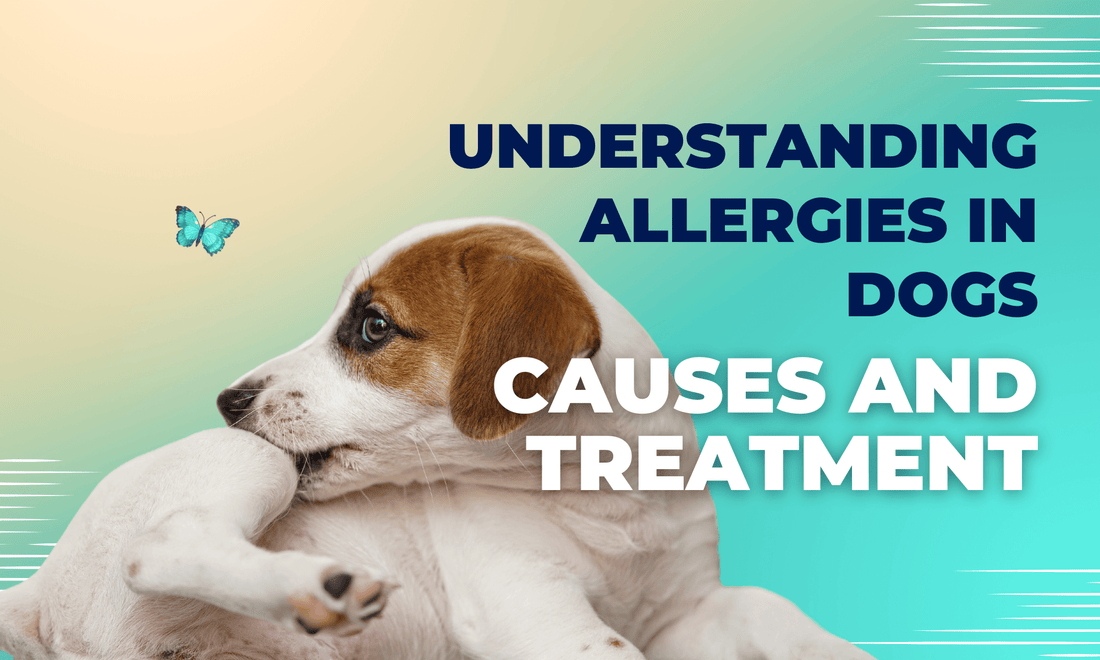It's important for dog owners to be aware of the numerous allergies that their animals may encounter. Dogs who have allergies may experience discomfort, agony, and even major health issues. Understanding dog allergies' symptoms, causes, diagnosis, available treatments, and preventative measures is crucial. In this article, we'll look at the many types of dog allergies and discuss how to spot, handle, and avoid them.
What is an allergy?
An allergic response happens when the immune system overreacts to a particular substance called an allergen. Allergens are often proteins from animals, plants, foods, or insects.
When the immune system is exposed to an allergen repeatedly over a long period, it becomes sensitized. This means that when the immune system encounters the same or related allergen again, it goes into overdrive. Allergies occur when the immune system responds excessively to an otherwise harmless foreign substance.
Allergic reactions are complex immune responses that involve allergen proteins binding to specific antibodies in the blood, which attach to mast cells. These mast cells are found in various tissues throughout the body. When allergens interact with mast cells, they release powerful chemicals like histamines, leading to inflammation. This inflammation causes symptoms associated with an allergic reaction such as itching, swelling, and redness.
Types of Allergies in Dogs
It is essential for pet owners to be aware of the various types of allergies that may affect their dogs. These allergies include food allergies, environmental allergies, and flea/tick allergies.

Food Allergies in Dogs
One of the most prevalent types of allergies in dogs is a food allergy. They develop when a dog's immune system overreacts to a certain dietary protein. Beef, chicken, dairy, wheat, soy, and other common food allergies in dogs include these.
Each dog may experience food sensitivities differently. Skin irritation, digestive discomfort, and ongoing ear infections are typical symptoms. Chronic diarrhea, vomiting, and appetite loss are further symptoms that dogs with food allergies may suffer.
A dog owner should visit a veterinarian if they believe their dog may have a food allergy. An elimination diet, which involves giving the dog a special diet with an unfamiliar protein and carbohydrate source, may be advised by the vet. This can help to pinpoint the dietary allergy that is causing the symptoms in the dog.

Environmental Allergies in Dogs
Environmental allergies, also known as atopic dermatitis, occur when a dog's immune system overreacts to substances such as pollen, dust mites, and mold. These allergens can be inhaled or come into contact with a dog's skin.
The symptoms of environmental allergies in dogs can include skin irritation, itching, and chronic ear infections. Dogs may scratch, bite, or lick at their skin to relieve the itching, which can lead to further skin damage.
To diagnose environmental allergies, a veterinarian may perform a skin test or a blood test. Treatment options for environmental allergies may include medications such as antihistamines, steroids, and immunotherapy. Environmental management, such as reducing exposure to allergens, can also help to alleviate symptoms.

Flea/Tick Allergies in Dogs
Flea/tick allergies occur when a dog's immune system overreacts to the saliva of fleas and ticks. Even a single flea bite can trigger a severe allergic reaction in some dogs. The symptoms of flea/tick allergies can include severe itching, skin irritation, and hair loss.
Preventing flea and tick infestations is the best way to prevent flea/tick allergies in dogs. This can be achieved through regular grooming and the use of flea/tick prevention products such as collars, sprays, and topical treatments. If a dog does develop a flea/tick allergy, a veterinarian may recommend medications such as antihistamines or steroids to alleviate symptoms.
Understanding the different types of allergies that can affect dogs is important for pet owners. Each type of allergy can manifest in different ways and may require different treatment options. If a pet owner suspects that their dog may have allergies, they should consult with a veterinarian for proper diagnosis and treatment. With proper management and treatment, dogs with allergies can live healthy and happy lives.
Causes of Allergies in Dogs
The causes of allergies in dogs can vary. Some dogs may be genetically predisposed to allergies, while others may develop them due to environmental factors. Additionally, a dog's diet can also play a role in the development of allergies. For example, a diet that is high in carbohydrates and processed foods can lead to food allergies.
Symptoms of Allergies in Dogs
Dogs with allergies may exhibit various symptoms, including itching, scratching, biting, licking, and rubbing. Other common symptoms include redness, inflammation, and skin irritation. These symptoms can differ depending on the type of allergy a dog has. For example, food allergies may cause gastrointestinal upset and chronic ear infections, while environmental allergies can lead to respiratory problems and chronic ear infections.
How common are allergies in dogs?
Regrettably, allergies are widespread in dogs, regardless of their breed or background. Typically, allergies manifest in dogs after they reach six months of age, with the majority of affected canines being over one or two years old.
Diagnosing Allergies in Dogs
Diagnosing allergies in dogs can be challenging, as the symptoms can mimic those of other conditions. Veterinarians may use various methods to diagnose allergies, including blood tests, skin tests, and elimination diets. It is essential to rule out other conditions before diagnosing allergies to ensure that the correct treatment is provided.
Treating Allergies in Dogs
Allergies are not just limited to humans; dogs can also suffer from them. The signs of allergies in dogs can range from mild itching and skin irritation to severe symptoms such as hair loss, ear infections, and even gastrointestinal problems.
When it comes to treating allergies in dogs, identifying the underlying cause is crucial. Allergies in dogs can be caused by a variety of factors, such as food, environmental allergens like pollen, and fleas. Therefore, it is important to work with a veterinarian to diagnose the cause of the allergy and create a customized treatment plan for your dog.
Medication options are available to help manage the symptoms of allergies in dogs. Antihistamines can help reduce itching and inflammation, while steroids may be used to control severe itching and inflammation. In some cases, immunotherapy, which involves administering small doses of allergens to your dog to help build up tolerance, may also be recommended.
In addition to medication, natural remedies and dietary changes may also help alleviate symptoms and prevent further allergic reactions. Some natural remedies include coconut oil, fish oil, and aloe vera. Dietary changes may involve switching to a hypoallergenic diet or avoiding foods that are known to trigger allergies.
Treating allergies in dogs requires a customized approach that takes into account the individual needs of your dog. Consulting with a veterinarian can help identify the underlying cause of the allergy and create an effective treatment plan that will help alleviate symptoms and improve your dog's quality of life.
Preventing Allergies in Dogs
Prevention is always better than cure. To prevent allergies from developing in dogs, it is essential to maintain proper nutrition, regular grooming, and control their environment. Keeping your dog away from potential allergens, such as pollen and dust mites, can help reduce the risk of allergies.
Conclusion
In conclusion, understanding allergies in dogs is essential for maintaining their health and wellbeing. As a dog owner, it is essential to recognize the signs and symptoms of allergies and seek veterinary care if necessary. By identifying and eliminating the root cause of the allergy, providing appropriate treatment, and taking preventive measures, you can help your furry friend live a happy and healthy life.



